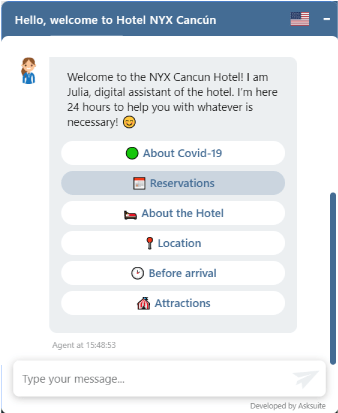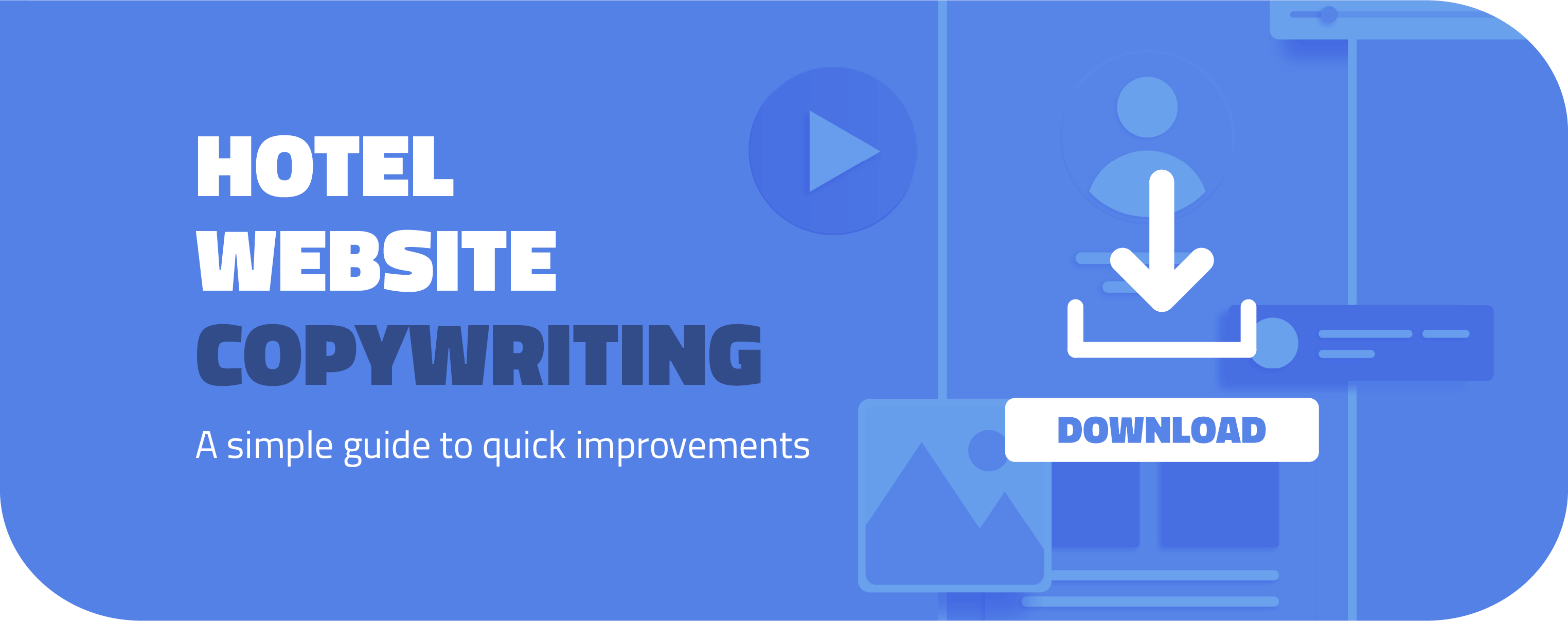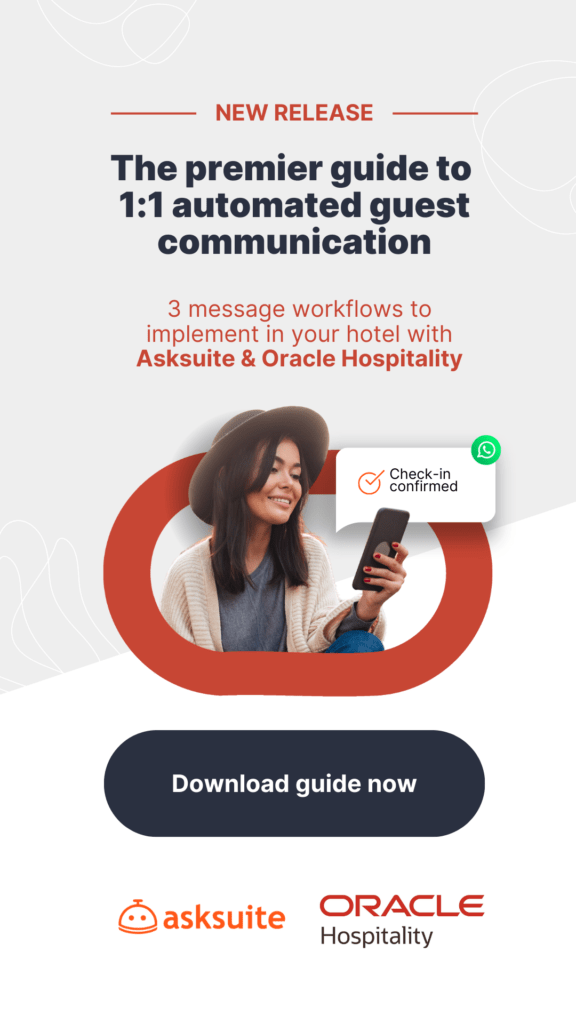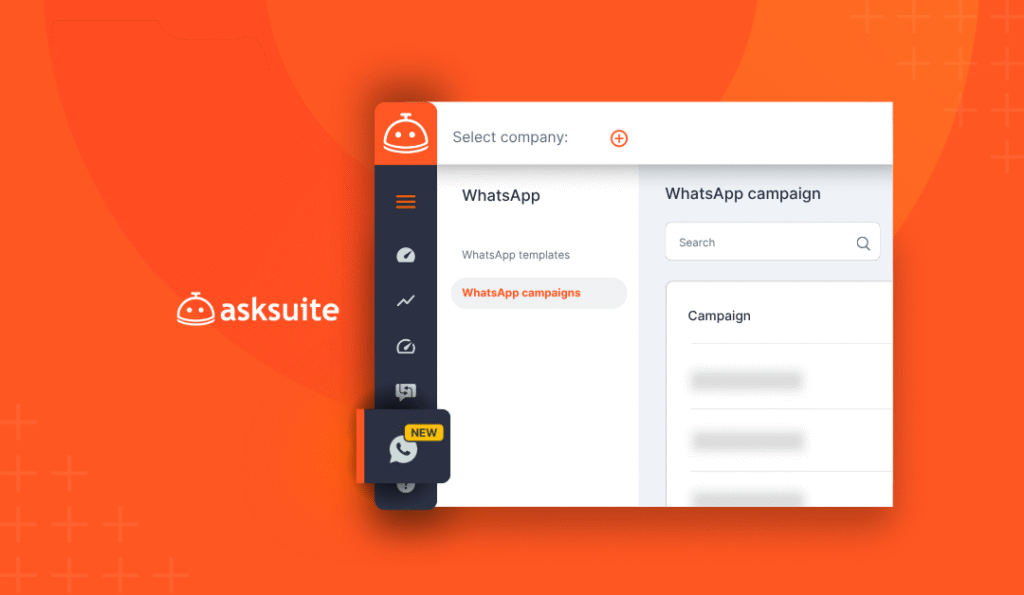*This article was contributed by Juliana Hahn, content creator and copywriter specialized in the hospitality and tourism industry
Think of your number one salesperson. Wouldn’t you do everything you can to help them do a good job?
Then why not do the same for your hotel website? After all, it’s out there 24/7/365 advertising your property and (hopefully) collecting direct bookings for you.
Take the first step now by crafting amazing copy that puts a spell on your site visitors and gets them to book!
In the following quick guide to hotel website copywriting, you’ll learn how to do just that.
Let’s dive right in!
1. Best practices for writing and presenting your hotel website content
There’s one thing you must always keep in mind when you design your hotel website and write your copy: People come to your site with a goal in mind. Usually, that revolves around making a decision for an upcoming trip.
Unsurprisingly, the top three things people want to do on your site are:
- Learn about your property (especially your Covid-19 measures these days)
- Check your rates, promotions, and packages
- Book a room
The easier you make it for them to accomplish these goals, the better… for several reasons:
- You’ll make a better first impression
- Your site will have a lower bounce rate (i.e. people will stay longer than just a few seconds because they find what they’re looking for)
- Site visitors will engage with your content
- More people will take desirable actions like sending an inquiry email or using your website chat
- Direct bookings will increase
Sounds great, right?
Then let’s look at how you can optimize your hotel website copy to help site visitors get what they came for and win them over at the same time.

Know who you’re writing for
Decide who you’re writing for (i.e. your target audience) before you put any words on paper (or in your word processor).
Your target audience will determine your tone of voice, the language you use, and the benefits you highlight.
After all, you want to address their needs in a way they appreciate.
Get to know your target audience by answering the following questions:
- How old are they?
- Where are they from?
- How do they travel (solo, with a friend or partner, with children, in a group…)?
- How long do they stay?
- What are they interested in?
- What’s important to them?
- How much can/do they want to spend?
You can find the answers to some of these questions in your hotel data. Check your PMS, RMS, and in your chatbot/live chat conversations. This will give you a good idea of who your guests were in the past.
[box type=”shadow”]A side note on changing target markets: Given the current travel restrictions, you may need to look at a different target market now though, e.g. local families instead of international business travelers. While that can mean a huge pivot, you can still learn a lot about these guests through research. Then you can address them effectively even if they weren’t your main target market before. Check out the Storytelling Masterclass by Paula Carreirão and myself for more on this topic.[/box]
After combing through your data, it’s time to do guest surveys and to browse the web to answer these two questions:
- What do people like most about your hotel?
- What do they write about your hotel on review sites and social media?
You may be surprised here. Sometimes guests appreciate things you don’t even have on your radar!
If you’re targeting a new market, find out what they’re saying about your competition to learn what they’re looking for and what they value.
Then make a list of the top points and phrases you read repeatedly. Speed up this process by copying reviews into a tool that creates a word cloud. It will highlight the top words and phrases for you.
This will make it easier for you to do two important things:
a) Use your guest’s language in your hotel website copy
b) Highlight people’s favorite facilities and services on your website to show them they’ve come to the right place.
Focus on user intent
We already stressed that people have a clear goal when they come to your hotel website. Make your site easy to navigate to help them achieve these goals.
Start with a clear navigation menu. Use straightforward headings instead of trying to be fun or too clever. The risk is that people won’t understand, get confused, and leave. Yikes!
Stick with simple headings like ‘Eat & Drink’, ‘Dining’, ‘Restaurants & Bars’, ‘Culinary’, or something of the sort for your F&B department. ‘Rooms’, ‘Suites’, ‘Accommodation’, ‘Sleep’, or the like work well for your rooms department.
Make all important information easy to find, so your site visitors don’t have play detective. List all key facts on the relevant pages and repeat them in your FAQ section.
Find out what your guests are curious about by asking your reservation and front office staff which questions they hear most often and by checking your live chat/chatbot. Include answers to those questions in your copy.
Here’s an example: your team gets a lot of questions from families traveling with young children about kid-friendly activities and entertainment on-site. Give all relevant information about your kid’s club (opening hours, location, activities, costs, facilities) and other options on the corresponding page and highlight the main points again in the FAQs. In the end, encourage people to contact you or use your website chat if they have further questions.

Less is more
Just like with most things in life, less is more when it comes to hotel website copywriting. When you’re writing for your website always remember nobody has time to read a novel.
Keep headlines, sentences, and paragraphs short and to the point. Stick to the most important facts and benefits in your descriptions.
Instead of writing a big, solid block of text about your rooms or restaurants, create a short intro paragraph with the key benefits to draw readers in. Then use bulleted lists to give more details like amenities, opening hours, or other details.
Combine different mediums
Your website should use a balance of various mediums that complement each other. That includes text, images, and maybe even videos. This will help site visitors picture themselves at your property and get them to dream of their stay with you.
For a fully immersive experience, consider adding a 360-degree virtual tour of your hotel.
Once your visual content has set the mood, your texts can provide extra details and flesh out the story you’re telling in your photos or video.

SEO basics for your hotel website copywriting
Of course, search engine optimization (SEO) is also something to consider while writing your website copy.
Here are a few simple steps you can follow to boost your site’s ranking:
→ Include keywords in your copy and your headings where possible. This can include language and phrases your audience uses as well as keywords you want to target. Don’t stuff your text with keywords though. It makes your copy harder to read and Google penalizes keyword stuffing. Keep in mind, you’re writing for your site visitor, not the search engine.
→ Use specific key phrases that include your USPs. This will give you a better chance to rank when people search for specific services you offer. Focusing on generic keywords like ‘hotel in [your city]’ probably won’t do you much good because they’re usually dominated by OTAs and major chains.
→ Link up your pages. Internal links are good for SEO, they help people get around your site and they make it easier to find important information.
→ Compress images and videos to decrease loading time. Using high-quality visuals is important for a good user experience but so is fast loading time. One way to decrease loading time (and bounce rate) is to optimize and compress your visuals.
→ Work on getting inbound links to strengthen your site’s authority. These links can come from media features, hotel reviews by travel bloggers, and social media mentions. This takes time and effort to do but can yield great results in the long run. If you have limited resources, focus on specialized outlets. Even if they’re smaller, they will do a good job of getting you in front of your target audience.
In this short video, Hotel Marketing Expert Jenn Zajac gives 8 Simple Tips on SEO:
Now that we’ve gone over some basic best practices, let’s look at some practical tips on writing new texts or improving your existing copy.
2. Quick tips for writing or improving your hotel website copywriting
Writing a good hotel website copywriting can be fun. Usually, the hardest part is getting started and putting down the first few words. Then it gets easier.
Whether you’ve already got some copy to edit or you’re just sitting down to write, here are a few ways to make your texts more engaging, convincing, and powerful.
Cut out fluff words
Fluff words bloat your copy without giving it more substance. They’re fine in everyday conversation because they add emphasis and nuance when you speak. But in written texts, they make your text cumbersome.
Below are some examples of simple, impactful changes.
♦ Try swapping qualifiers for more powerful words instead:
Really beautiful → stunning, spectacular, gorgeous
Very big/large → vast, expansive, spacious
A lot of options → Numerous, many, countless options
Extremely special → One-of-a-kind, distinctive, exceptional
♦ Replace long phrases with shorter ones:
Due to the fact that → because, since
In the event that → if
With the exception of → except for, apart from
At the present time → now, currently, at present
♦ Also, try to ditch repeat phrases like this:
And also – We offer buffet breakfast and also an in-room dining option.
Own private – Enjoy the views from your own private balcony.
Now, go through your copy and see which fluff words you can eliminate to make your copy more concise and easier to read.
⇒ If you prefer, you can download the guide now and read it later. Or simply continue reading here on the blog!
Switch up your word choice
Some words get used so often, they’ve all but lost their meaning. They don’t have the same effect on readers anymore because these words pop up everywhere.
Try to find alternatives in your copy to make your texts engaging and keep readers from thinking: “I just read the same thing on the other hotel website…”
Here are some examples of overused words and alternatives:
Beautiful → Magnificent, brilliant, splendid, superb
State-of-the-art → advanced, high-tech, sophisticated
Modern → contemporary
Delicious → mouthwatering, delectable, scrumptious, yummy
Check your competition to find out which words are commonly used in your market. Then try to be different where possible. That doesn’t mean you can’t use any of the same words your competitors do, but you should avoid sounding too much like them.
Depending on your property and target market, the words above may not work for you. Find words that fit your style by using the synonym finder in MS Word (right-click a word and hover over ‘Synonyms’) or checking a thesaurus.
Active vs. passive voice
Passive voice weakens your copy, so use the active voice where possible.
Here’s a quick example of the difference between active and passive voice.
In the active voice, the subject of a sentence is doing an action: John is serving breakfast. (John is the subject. He’s doing the action – serving breakfast.)
In the passive voice, the subject is receiving an action: Breakfast is being served by John. (Breakfast is the subject. It’s receiving the action – being served.)
The message is the same. In both cases, we understand that John is handling the breakfast service. But the sentence in the active voice feels clearer and more decisive. The passive sentence is also longer and feels a bit distant.
Make your hotel website copywriting clearer, more personal, and effective by using the active voice.
Here are some more examples:
• Please send us your question and you will be contacted shortly. → Please send us your questions and we will contact you shortly.
• Book an airport transfer and you will be picked up by our driver. → Book an airport transfer and our driver will pick you up.
Where is unnecessary passive voice hiding on your website? Find it now and replace it!
Use calls-to-action
A call to action (CTA) is exactly what it sounds like: it tells your reader what to do next. Examples include ‘Book now!’, ‘Subscribe to our newsletter today!’ and ‘Join our loyalty program!’
Use CTAs to guide people around your site and help them explore. For example, add a ‘read more’ button after the introduction to your F&B department, so they can learn more about it if they’re interested.
If you use CTAs strategically, they can increase the number of people who take the desired action, like getting in touch with you or making a booking. Only use CTAs where it matters though. If you overdo it, site visitors will feel overwhelmed and click away.
Make your CTAs more effective by adding a benefit. Instead of just saying ‘Ask us your question in the chatbox’ add the benefits guests will get out of it, like so: ‘Ask us your question in the chatbox and get an instant reply.’ A similar example: ‘Book direct now and get a complimentary welcome drink’ instead of just ‘Book now’.
And that’s a wrap! Now that you have all these tips on improving your hotel website copywriting, which one are you going to apply first? Do you already have some changes you’d like to make?
If you’re strapped for time (which hotelier isn’t?), I recommend you pick one tip to start with and apply it, then continue with another one next time around.
The most important thing is to get started. Then you can make improvements step by step until you’re confident your website does the best possible job at enchanting your site visitors and getting them to book.
 About the author: Juliana Hahn is a content creator and copywriter specialized in writing for the hospitality and tourism industry. Before diving into the world of copywriting several years ago, she studied hotel management and worked in hotels around the globe. Today she leverages her industry experience to craft engaging content for hospitality tech companies, hotels and online publications. You can find her at www.hospitality-copywriting.com.
About the author: Juliana Hahn is a content creator and copywriter specialized in writing for the hospitality and tourism industry. Before diving into the world of copywriting several years ago, she studied hotel management and worked in hotels around the globe. Today she leverages her industry experience to craft engaging content for hospitality tech companies, hotels and online publications. You can find her at www.hospitality-copywriting.com.
Tired of looking for the best ways to convert more bookings on your hotel website? Asksuite & Umi have joined forces to help your website stand out and make direct reservations go sky-high with a curated selection of guides and materials, which you can download for free: [Download Now]







